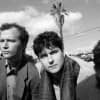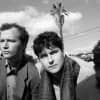I’m not saying things didn’t happen in the last week or two. Oh, they happened. But I am going to forgo my usual "things happened" update to concentrate on the ripples of one particular stone that was tossed into tropical waters. Namely: the much-linked Ghetto Bassquake blog has followed the lead established by Masalacism and started its own label. The flagship release is the single “Fraudian Slip” from the band called Hackney Empire. The main dude in HE is A.J. Holmes, who plays the kind of virtuoso arabesques in afropop guitar that inspire critics to break out the L words (lush, lilting, etc), and a voice that reminds me of either the dude from the B-52s or Malcolm Mclaren saying: “In the summertime in New York City.” Or possibly Joe Strummer doing his spoken word thing on “Death is a Star.”
Accordingly, I worked some HE jams into an Indie-Trop Part 2 blend, then got with the man behind the Bassquake label, Will “Vamanos” Quiney, along with frequent Bassquake blog contributor Chief Boima (who's apparently featured as an artist on an upcoming release), to pick their respective brain-cases on burning questions—What makes music tropical? Why the hell anybody would start a label in 2010?—along with other heavy topics. Listen and read the full Q&A below.
Indie-Trop 2 / Hackney Empire Blend:
Hackney Empire, “Schloss Lanke”
Talking Heads, “Naive Melody (This Must Be The Place)”
Vampire Weekend, “Blake’s Got a New Face”
Hackney Empire f. Afrikan Boy, “Your Latest Status Update”
Hackney Empire f. Kastro, “Fraudian Slip”
Gaspar Lawal, “Kita Kita”
Ghetto Palms: Why start a label in 2010? Are you pursuing an online label as a profitable business model?
Will "Vamanos" Quiney: It's something I’ve wanted to do for years, but had never found the right music that inspired and excited me enough to actually go for it. Running the blog has obviously given me the opportunity to connect with artists and then promote them, so starting a label felt like the natural progression. I'm so excited to actually be finally doing it. I definitely don't see it as a business model initially but we'll see. Ahem… Ghetto Bassquake Tees coming soon!
Chief Boima: I think the biggest benefit is to be able to control your own interests in your product/art/music/vision and—in my idealistic mind—that mass media as democratic medium puts collective power into more peoples' hands. Of the people I know that have started labels in this age, I can't think of one that has entered into the business to make MONEY in the old-school music industry sense. Everyone seems to be pretty aware that the old business model is dead and dying. I get really excited by "alternative" or informal music industry models. I just came back from South America and was excited to see how the different local music economies are set up, from La Paz (Bolivia) to Baranquilla (Colombia).
What is the story with debut artist Hackney Empire—how did they form and how did you link up with them?
WQ: The band was started by A.J. Holmes, a super-talented musician and DJ who runs the Secousse night with myself and Radioclit. He was trained in the pan-African guitar style by his Sierra Leoneon neighbor, Folo Graff, and also played with a 20-piece Congolese group in Germany called Les Beaux de Gosses de Berlin. He formed the band just over a year ago and they instantly blew me away. They have a really high-energy show like a soukous band. After watching them from behind the decks every month (they have become the resident Secousse band) and seeing the crowd go consistently nuts, I thought, Damn we have to get this down on record especially as they've got so many great songs. We were talking one night and Etienne from Radioclit suggested I manage them. I was like, Well, I don't have the time right now but why don't you produce them and I'll put it out. A few months later we were in the studio. We are only putting out their first single right now and I haven't signed them in the traditional sense.
What’s the significance of the name for those of who are no longer British subjects?
WQ: The band share their name with a historical music venue and theater in East London, which has hosted everyone from Charlie Chaplin to old school grime raves in the early 2000s. They follow an old London band tradition of naming themselves after London buildings or landmarks—e.g. The Newham Generals named themselves after the Newham General hospital. Hackney has a really multicultural population and the band represent that in some ways. Their parentage is a mixed bunch from Iraq, Trinidad, Congo, Italy, Sierra Leone, Kenya, India, as well as British. They describe their sound as the New Electric High-Life—it has a strong West African musical sensibility but also a really British aesthetic. Their sound is completely infectious and raw. They are genuinely one of the most exciting live bands I've seen in years. The single will be out digitally for purchase on iTunes, etc, on September 24th with awesome remixes by Chief Boima, Uproot Andy, Erick Rincon & Moroka. We are following it up with a limited edition 7-inch vinyl, too.
What is the general vision for Ghetto Bassquake, the label? Is there a release schedule beyond HE's debut? How closely will the aesthetic of the label reflect the mission and balance of music in the blog?
WQ: I'm not going to be banging out singles every few weeks—I want to take my time and make sure each track is really special. The label will reflect the music we cover on the blog, centered around African, South American and Caribbean sounds. Some would broadly describe the feel as "tropical." I personally really like fun, energetic party music, so I'm keen on putting out music that has an emphasis on positivity, something that people seem to really connect with at the moment. I also have a Chief Boima release planned, which I'm also very excited about. For me, he is making some amazing stuff right now. We're going to be working on some podcasts and videos. It's early days though, as well as the blog, the label and the club I work as a film music supervisor in my day job. Finding the time to do everything can be quite a challenge.
CB: My general vision would be to help produce and promote friends that I've met around the world. But I think my role in the label will be more artist/producer, to look for music that I would want to share anyway, and then see if those artists would like to release something through us.
What the hell is tropical music? What is it that puts a Casio beat recorded in Abidjan in the same bag as an SP-1200 chop of the Eurythmics (or whatever) recorded in Rio? What puts both of them in the same bag as Hackney Empire or, for that matter, Radioclit? Do you make a distinction between new electronic genres emerging from the third world or tropical countries and European or first world music that is conceptually, self-consciously “tropical”?
WQ: "Tropical" seems to be a fashionable term that's a little overused right now, in everything from brightly-colored clothes to an electro track with a few sampled horns on it. I'm certainly guilty of using it myself descriptively, as it's easier for people to understand instead of trying to quickly describe a genre like funana or chicha music to someone. When I play a style of music to someone for the first time, they often say, This sounds like holiday music—you know, the stuff you hear at the beach or a carnival. You can't argue with that. In fact, I've noticed that a lot of the crowd at Secousse are on holiday in London from all over the place—Dominica, Sweden or wherever—who have heard about the club. So maybe the music is all about escapism wherever you are.
Speaking for myself, I grew up loving hiphop, reggae and dance music and I feel that many of the genres that I cover on the blog have similar influences wherever you go in the world. It's obviously a lot to do with bass as well. I'll never forget hearing DJ Marlboro at Sonar in 2004. That was a really important moment for me, as was a long trip around parts of Latin America around that time, finding styles like reggaeton, baile funk and cumbia in their home environments that I'd never been exposed to in Europe was really inspiring.
I don't think there is much to be gained by consciously trying to separate music from its original sources and music that it may have inspired from other worlds. Over the last few years I've noticed so many scenes overlap, and it's really exciting to see artists, labels and genres collide no matter what country or scene they are from. To me it's kind of irrelevant that a baile funk producer makes a kuduro inspired beat or a kid from Switzerland makes a soca track. It's just always good to hear something progressive and original and then selecting the wheat from the chaff.
CB: I think the way some people use tropical is relevant to their experience with climate and culture. It describes something tangible in many peoples' minds, and there's nothing that really defines that in a broader sense, because the feelings that people get from it are subjective. Maybe it reminds them of their youth, maybe it reminds them of a vacation they took, but climate and environment are very important in the creation of culture, so it makes sense people would describe something that way.
For me, the music is more "global urban" or "global digital," or something which hints at the way we all are mixed up and living in urban centers with people from around the world, and communicating across physical boundaries. On every continent today you have these urban centers where there are non-native people living and changing the culture of the place. I think the most interesting cultural products are the results of overcoming challenges that are realized through creative energy and technology.
I like personal art. I remember an idea from a film theory class I once took, that creativity was the ability to bring to life an image or idea regardless of resources. In a lot of these places, the musics we pay attention to are ones that are lacking in some kind of resource—technology, money, experience, ability to travel—people are improvising with what they have to create something new. Music makers have the ability to express a feeling and make an audience react and maybe understand this abstract thing that is your culture. So scale models in Star Wars is just as interesting to me as samba rhythms drummed on an MPC. It's like replacement reality, but still experienced by people as real.
There is a lot of overlap between the blogs/crews/labels that follow this loose idea of tropical music: Ghetto Bassquake, Mad Decent, Dutty Artz, Bersa Discos, Masalacism and a handful of others. Do you think that’s healthy? Do you view them as compañeros in the struggle or competitors in the same market space? Will the transition from blog to label change that answer at all?
WQ: Yes, there is a lot of overlap, but I don't see any of the labels you mentioned as competitors. I only have a massive respect for them and love the music they are putting out. In fact, all the ones you mentioned are among my favorites and everyone has a slightly different slant on what they cover and release. I like the idea of artists spreading themselves around the labels, e.g. Boima releasing tracks on Ghetto Bassquake, Bersa Discos & Dutty Artz. It keeps things fresh. I feel that the idea that a label owns an artist is in some ways becoming outdated in these fast-moving scenes. The more labels and blogs there are, the more chance the music has to be exposed to a wider audience which can only be a good thing, with the better ones shining through.
CB: I think overlap can be good and bad. If you have this closed circle of people who are just connecting with each other, and nothing is coming in, then things can stagnate. You gotta pump in some fresh water every now and then, and I think most of us are aware of that. No one is the real gatekeeper of this thing, and I feel real encouraged by that. The more voices the better.
Plus, a lot of us have become homies over the years, or like you say compas, so we are all kind of trying to spread this message of global ambassadorship and create a more aware world.


